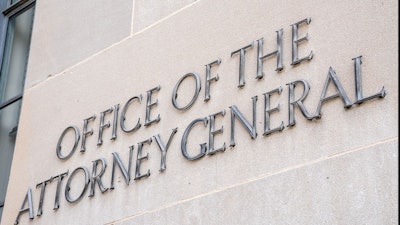
A group of Massachusetts cannabis operators, who have long waited for legislative action to remedy the challenges of running businesses in the state-legal cannabis industry within the framework of federal prohibition, are suing U.S. Attorney General Merrick Garland over enforcement of the Controlled Substances Act.
While more than half of the U.S. population now lives in a state where cannabis is legal for adult consumption, the Controlled Substances Act (CSA) designates cannabis among the most dangerous and addictive drugs, and the ramifications of that continue to stymie licensed businesses that grow and sell regulated products and create barriers for consumers.
And although there is some momentum for change in federal cannabis policy, as the Secure and Fair Enforcement Regulation (SAFER) Banking Act—a revised version of the long-stalled SAFE Banking Act—gets another chance in Congress, and as the Drug Enforcement Administration (DEA) reviews the U.S. Health and Human Services’ recommendation to reclassify cannabis, there is no guarantee, nor exact timeline, for these efforts. Meanwhile, small and multistate cannabis operators, their employees, consumers and patients, get caught up in the bewildering dichotomy of legalized states in a country where cannabis is still illegal federally.
A coalition of cannabis businesses in Massachusetts, represented by law firms Boies Schiller Flexner LLP and Lesser, Newman, Aleo & Nasser LLP, announced at the end of October that they had filed a lawsuit against Attorney General Garland over the enforcement of the CSA. Under the CSA, cannabis is classified as a Schedule I drug, with “no currently accepted medical use,” all while nearly 40 states have approved medical cannabis use and regulate markets for patients with dozens of qualifying conditions.
Meg Sanders, CEO of Canna Provisions, which operates two dispensaries in Massachusetts, is one of multiple plaintiffs who has joined the suit calling for the federal government to stop interfering with state-legal programs. “As long as today, someone’s being arrested for cannabis, we’re not putting down our swords,” Sanders said in an interview with Cannabis Business Times.
“How long have we been hearing about SAFE and SAFER? How long have we been hearing about rescheduling? There's a lot of people with a ton of passion that want to see it done, but … I feel like I'm not looking at rescheduling to a Schedule III as necessarily a positive for anybody in this industry,” said Sanders, who also led Colorado-based Mindful through the early days of legalization. “This [lawsuit] feels very right to me. It feels logical. There's a process, which cannot be skirted, so it's not hoping that somebody calls our bill. It's not hoping that the DEA and the FDA and everybody works together—when have they ever done that? I'm really just hoping that we're on the right path here.”
ALSO READ: Mindful’s Meg Sanders: The Power of Positive Branding
Josh Schiller, partner at Boies Schiller Flexner LLP, said he and his colleagues have been working actively for more than a year on the complaint, speaking to licensed cannabis business owners, researching and “refining legal theories,” but the seeds of this effort go back much further.
“I was a law student when the Supreme Court held, in the Gonzales v. Raich case, that the federal government could prohibit chronically ill patients from growing marijuana in their own homes for personal use,” Schiller said in an email to CBT about the 2005 decision when the Supreme Court rejected a challenge to the CSA’s cannabis prohibitions. “For years now, my colleagues and I have been thinking about finding a way to revisit that decision. In particular, with the expansion of legalization throughout the states, we saw a lot of suffering caused by the federal prohibition: businesses suffering from unequal and discriminatory treatment, and consumers and patients suffering from lack of access.”
According to a press release about the lawsuit, the attorneys note that, “A critical factor in that decision, Gonzales v. Raich, was that the federal government intended to ‘eradicate’ the market for cannabis nationwide. The court concluded that the federal goal of eliminating commerce in cannabis, combined with the assumption in 2005 that intrastate marijuana could not be differentiated from interstate cannabis, justified the Controlled Substances Act's prohibitions on intrastate cannabis. Neither of those facts, however, are true today.”
The lawsuit calls the federal government’s enforcement of the CSA on state-legal cannabis businesses unconstitutional and unfair. These operators are licensed, regulated, and must adhere to strict guidelines for product testing, distribution, marketing, hiring and much more. Because cannabis is illegal at the federal level, it means cannabis operators can’t take normal tax deductions afforded to other companies, which is not sustainable and hinders their ability to compete with the illicit market.
Sanders said it goes beyond taxes and bank accounts, and that the CSA has a “domino effect” that makes it more cumbersome to do everything from finding legal services to managing payroll and that there is limited access to “strategic, thoughtful financial services.”
“Changing our tax structure and our budget or how we work to manage that giant tax bill, that would be hands down, just such a relief to know that we actually have cashflow, more than the small amount that we are managing right now,” she said. “People think, ‘Oh, you have access to banks.’ But financial services is way bigger than a checking account or a savings account. So we're very fortunate that there's lots of banks that participate. But I can't take a Visa or a MasterCard because of the federal illegality. I have to use a pretty complicated accounting process as well as a complicated legal structure. So we pay way more for accounting and legal than most traditional businesses. I should be able to digitize my cash way easier. … It's just painful.”
And, as Sanders pointed out, it’s not just businesses that suffer—it’s employees, who are sometimes prevented from getting traditional loans and face other barriers because of their affiliation with the cannabis industry. Healthcare and 401K options are also limited, and she noted that, “These are real life challenges that make this business so difficult.”
“Think about employees who can't get a mortgage, can’t buy a car or who get bank accounts shut down because still today that's happening. It’s not just corporate America that's being affected by this really archaic code tax code,” Sanders said. “And we're kind of past the, ‘you decided to go into the industry’ [argument.] We're done with that. The industry is in 38 states, and Americans overwhelmingly support safe access to this plant.”
What they are asking is to simply be treated like any other normal business, Sanders said. Like many other cannabis companies, Canna Provisions goes above and beyond to support the communities in which it serves. In November, the Chamber of Commerce in Lee, Mass., presented the company with the 2023 Corporate Citizen of the Year award, which “recognizes a local corporate citizen whose generosity in charitable giving tremendously impacts the region being served.” Canna Provisions is the first cannabis company to receive the annual award from the local chamber.
Other plaintiffs include Gyasi Sellers, CEO and Founder of Treevit and Wiseacre Farm, which, like Canna Provisions, are local, independent Massachusetts-based businesses. In addition, multistate cannabis operator Verano Holdings is named a plaintiff, and MSOs Ascend Wellness Holdings, TerrAscend and Green Thumb Industries are foundational supporters. Investment companies Eminence Capital and Poseidon Investment management are also named in the suit.
“We were looking for and found in our plaintiffs a representative example of the types of businesses that lawfully abide by state marijuana laws and whose stories describe American entrepreneurialism at its finest,” Schiller told CBT. “They show the diversity of the people involved in these businesses, and they demonstrate the good that this industry can accomplish by providing consumers and patients with safe and regulated access to marijuana. Our plaintiffs also show the myriad ways in which this industry, not just at the corporate level, but at the personal level is suffering—with everything from bank accounts being shutdown to employees being turned down for mortgages.”
Schiller said that the team moved as quickly as possible to finalize the lawsuit, and that they aren’t waiting for nor relying on legislative action.
“When you have clients that are suffering, the goal, as lawyers, is to get them relief promptly. Our lawsuit ended up coinciding with the House electing a staunchly anti-marijuana speaker,” Schiller says of the confirmation of House Speaker Mike Johnson, who has consistently voted against cannabis reform. “That timing wasn’t intentional, but it highlights that businesses cannot count on legislative action to fix the constitutional problems with the federal prohibition. There is no reason to wait to see what transpires with rescheduling or SAFER. Neither of those will fix the fundamental problem that our clients are deemed criminals under federal law.”
Schiller said that the next step is for the attorney general to respond to the allegations, when there may be either a motion to dismiss the lawsuit or respond. The team is willing to “take the case as far as it needs to go to get relief,” he said, and believes it will move forward to summary judgment and then go through a series of appeals.
“Because the law that we are challenging is a federal law, it applies to businesses and individuals nationally,” he said about the potential impact. “So a judgment declaring it unconstitutional would eradicate the impact of federal criminalization on all businesses and individuals abiding by state regulations in every state where marijuana is legal.”
Sanders said the potential positive impact of winning this lawsuit cannot be overstated.
“We were thrilled to be invited to join in and tell our story as part of this and how this impacts us on a daily, hourly, minute-by-minute basis. It is incredibly painful to be in cannabis with these issues of federal illegality,” she said. “We all know that, but we're not making progress other ways. This was another way to get things moving in the right direction.”


























